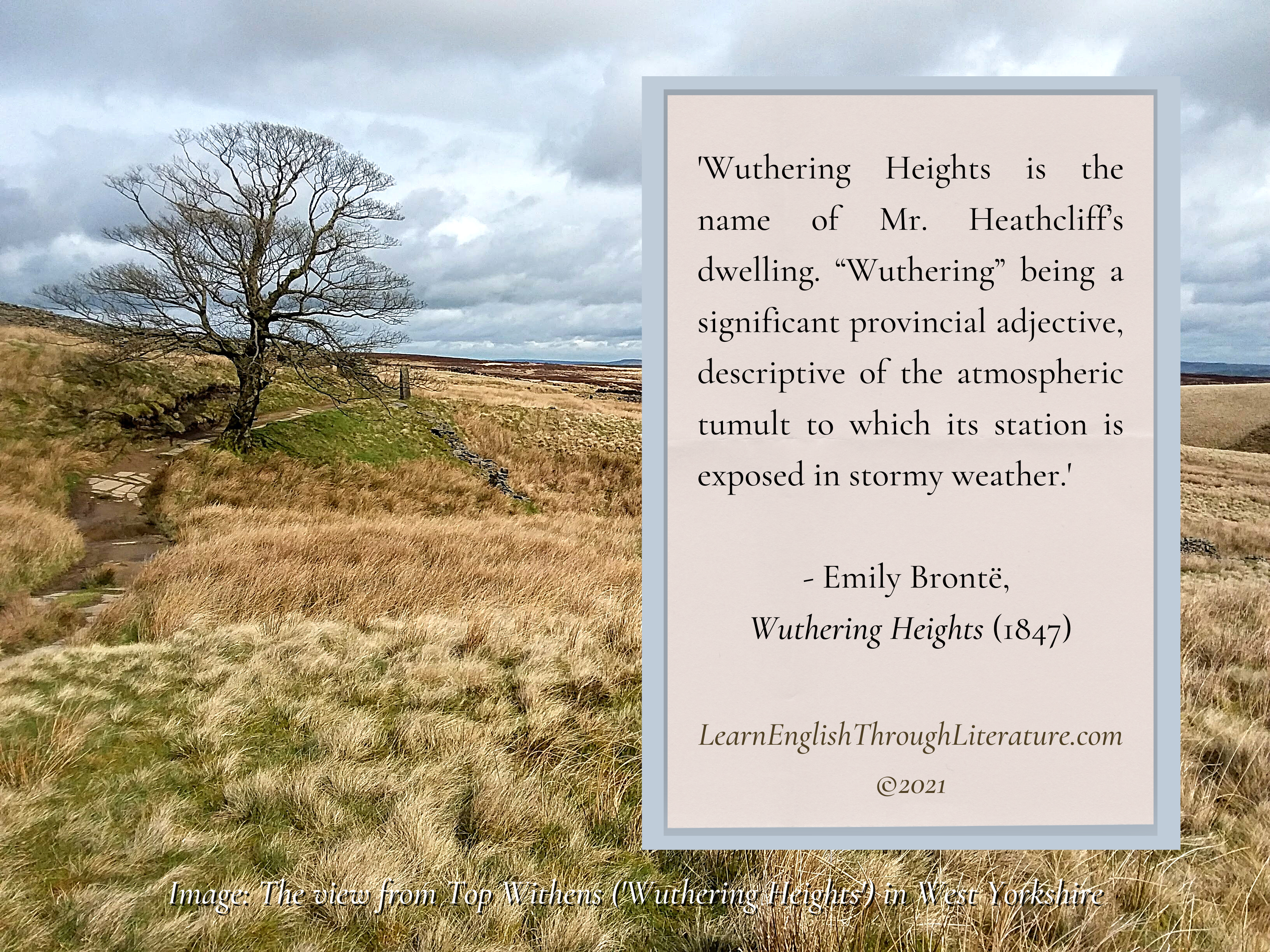📙 ‘Wuthering Heights is the name of Mr. Heathcliff’s dwelling. “Wuthering” being a significant provincial adjective, descriptive of the atmospheric tumult to which its station is exposed in stormy weather.’
– Emily Brontë, Wuthering Heights (1847)
Have you ever been confused about the differences between ‘being’ and ‘been’ in English? 🤔
✍️ Both of these are participles of ‘to be’: ‘being’ is the present participle and ‘been’ is the past participle.
In this Lesson we will focus primarily (mostly) on ‘being’ as it has so many uses, including:
- ☑️ Continuous tenses
- ☑️ Passive mood
- ☑️ Impersonal, formal voice
- ☑️ Gerund
- ☑️ Noun meaning ‘human being’, ‘entity’, or ‘existing person’
- ☑️ Participle clauses
I hope that this Lesson will help you understand both what ‘being’ means and how it functions, so that later on you can easily recognise for yourself how it differs from ‘been’ (a comparison which we will look at throughout this Lesson and in the next).
👉 Remember: once you fully understand these points, you will be better equipped to write and speak intermediate, even advanced English with more clarity and complexity.
…
📝 BEING vs BEEN: A QUICK OVERVIEW
✍️ ‘Being’ is the present participle of ‘to be’ and it can be used with any form of ‘be’ (e.g. ‘am’, ‘is’, ‘are’, ‘was’, ‘were’, etc).
While ‘being’ has many different functions and you might feel unsure when to use it (instead of ‘been’), here is one tip to help you identify when you need to apply it.
👉 TIP: Check what verb is found before it. ‘Being’ is almost always preceded by one form of ‘to be’ (unlike ‘been’ which is always preceded by a form of the auxiliary verb ‘to have’).
Now let’s look at each different aspect of ‘being’ below.
…
#1 📝 DESCRIBES AN ONGOING STATE OR ACTION
It can be used to describe a continuing or ongoing state.
📙 ‘That made her cry, at first; and then being repulsed continually hardened her …’
– Emily Brontë, Wuthering Heights (emphasis mine)
In this sentence above, we hear about the relationship between Cathy Earnshaw and her father. He used to often say that he regretted ever raising her as his daughter, something that ‘made her cry’, and this regular occurrence of ‘being repulsed continually’ had the effect of making her tougher or hardened over a long period of time.
✍️ That said, ‘being’ is also important in helping us to distinguish between a person and a temporary, if ongoing, behaviour.
For example, an angry teacher might say to a student, ‘Don’t rush through your homework like that, you are being lazy’. It differentiates (notices the differences) between what they are doing at the moment, and what they are. It is different from (and not as harsh as) saying ‘you are lazy’, which means ‘you are [always] a lazy person’.
In this next line, the character Edgar Linton is talking to his wife, suggesting that in her excitement about seeing Heathcliff again she might just end up acting absurdly. This is not the same as telling her that she ‘is an absurd person’ (i.e., that she is so all the time).
📙 ‘“You bid him step up,” he said, … “and, Catherine, try to be glad, without being absurd. The whole household need not witness the sight of your welcoming a runaway servant as a brother.”’
– Emily Brontë, Wuthering Heights (emphasis mine)
✍️ ‘Being’ in this sentence is in the present continuous tense. However, in the sentence below, it is in the past continuous tense because the rest of the sentence’s verbs are also in past forms. In other words, we look to other verbs’ tenses in the sentence to decide which tense ‘being’ is in.
📙 ‘… the young master being entirely negligent how they behaved, and what they did, so they kept clear of him.’
– Emily Brontë, Wuthering Heights (emphasis mine)
…
#2 📝 DESCRIBES AN EMOTIONAL OR PHYSICAL STATE
Here are some further passages from Wuthering Heights, which show how ‘being’ is often connected with an emotional or physical state: ‘being afraid’, ‘being happy’, ‘being thirsty’, etc.
📙 ‘I did not want him to yield, though I could not help being afraid in my heart.’
– Emily Brontë, Wuthering Heights (emphasis mine)
📙 ‘“… Oh! Nelly, the room is haunted! I’m afraid of being alone!”’
– Emily Brontë, Wuthering Heights (emphasis mine)
📙 ‘I conjectured that this preparation was probably for our supper, and, being hungry, I resolved it should be eatable …’
– Emily Brontë, Wuthering Heights (emphasis mine)
📙 ‘You talk of her mind being unsettled.’
– Emily Brontë, Wuthering Heights (emphasis mine)
📙 ‘Now, I have the satisfaction of being sure that he detests me, to the point of its annoying him seriously to have me within ear-shot or eyesight …’
– Emily Brontë, Wuthering Heights (emphasis mine)
…
#3 📝 THE PASSIVE MOOD
Another way that ‘being’ can be used is in the passive voice, when someone or something is receiving an action. For example, ‘Your application is being processed’. The ‘processing’ is happening to your application.
📙 ‘… she had caught a cold with the doors being left open …’
– Emily Brontë, Wuthering Heights (emphasis mine)
…
#4 📝 THE FORMAL VOICE
This passive voice sense of ‘being’ is also very important in formal or professional language, where an impersonal voice is valued most.
Formal language sounds impersonal because it is passive and gives us the point of view of the person or object receiving the action – e.g., ‘Your application is being processed’ doesn’t mention who is doing the processing, only ‘your application’.
So you may find official documents or communications that use ‘being’ in this way.
…
In Part 2 of our Lesson, we will cover four other important aspects of ‘being’ that you must not miss!




